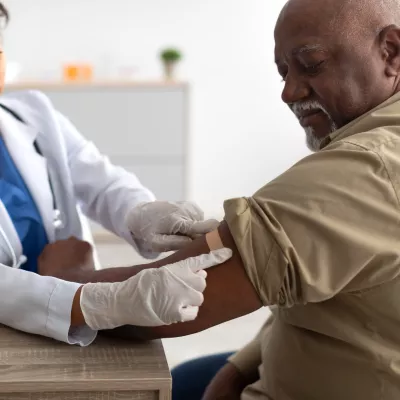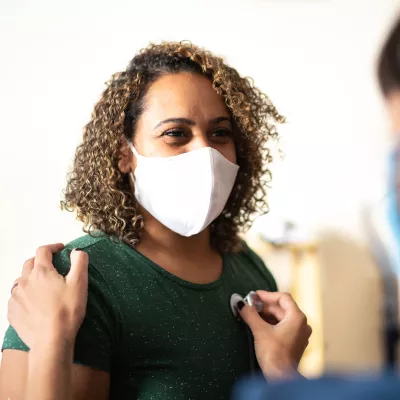- AdventHealth

Every 40 seconds, someone in the U.S. has a heart attack, according to the Centers for Disease Control and Prevention (CDC). But when that person with heart attack symptoms is you or a loved one, the situation can seem unreal.
A heart attack is a medical emergency that you need to get care for quickly. When you experience a heart attack or other cardiac symptoms, your first thought might be to lie down and see if you feel better. But waiting can waste precious time. The sooner you seek emergency cardiac care by calling 911, the sooner you can get treatment to reduce the amount of damage to the heart muscle, if you need it, for optimal recovery.
It’s Safe, and Necessary, to Go to the ER Care for Cardiac Emergencies
As scary as a cardiac emergency is, rest assured that we’re here for you. Whether you need emergency cardiac care for a heart attack or another heart condition, our emergency room teams are available to provide skilled emergency cardiac care for you 24/7. We’ll address your emergency quickly while taking extra measures to protect and keep you safe in our facilities.
Potential Heart Attack Symptoms You Shouldn’t Ignore
A heart attack occurs when a part of the heart doesn’t get enough blood, which may be caused by a blocked artery. This could be a result of coronary artery disease or a sudden contraction of the heart muscle that prevents blood from flowing to the heart as it should.
Call 911 if you experience symptoms of a heart attack, including:
- Chest pain or discomfort
- Feeling weak, light-headed or faint
- Pain or discomfort in one or both arms or shoulders
- Pain or discomfort in your jaw, neck or back
- Shortness of breath
Other symptoms of a heart attack could include tiredness, nausea or vomiting. Women are more likely than men to have these symptoms. Seek help immediately by calling 911.
At the hospital, our emergency room providers and your cardiologist can run tests to find out if a heart attack is happening and decide which treatment is best for you.
What Our Emergency Room Teams Are Doing to Protect You
To protect and keep you safe if you or a loved one needs emergent cardiac care, we’ve made some important changes. Here’s what you can expect when you enter the hospital emergency room, should you need emergent cardiac care.
Temperature Checks at Entry Points
We’re checking everyone’s temperature upon arrival — patients, visitors, team members and all our health care providers. That’s because most people who have symptoms of COVID-19 develop a fever, according to the CDC.
Separate Care Areas for People Who Are Sick
Anyone who has concerning symptoms, like a fever, will be cared for in separate spaces. If you need emergent cardiology care, you can take comfort that everyone you come into contact with will have had their temperature checked.
Masks for Everyone
To help slow the spread of illness, the CDC urges everyone to wear cloth face coverings when in public. To support this important safety step, all AdventHealth team members and visitors must wear a surgical loop mask when in an AdventHealth facility.
Rest assured that all health care providers and staff will also be wearing safety equipment, including masks. We have supplies of personal protective equipment, such as masks and gloves, for our health care providers. As a cardiac patient, you will be given a mask to wear when you enter the facility.
Social Distancing in Our Facilities
We have redesigned our emergency department waiting rooms to help visitors and walk-in patients better practice social distancing. You may notice covers on seats that say, “Thank you for leaving this seat empty. We’re social distancing to keep you safe.” You’ll also see stickers on the floor that say: “Here’s your spot. Thank you for social distancing,” to help you stand 6 feet away from other patients when you’re waiting in line.
When you come inside for follow-up and other appointments, you may notice barriers like screens at registration desks. We are also limiting the number of people in each facility at all times.
Frequent Disinfecting and Cleaning
We’re also frequently cleaning the emergency department lobbies, patient rooms and high-touch areas throughout the hospital with an approved cleaning solution that eradicates viruses. Our clinical staff practice frequent hand-washing too.
Stay in Touch With Your Cardiologist, Even From Home
To help better manage your heart health between office and hospital visits, stay in touch with your physician. You can easily talk with your primary care doctor or cardiologist virtually about the care you need.
You may even be able to schedule a video visit with an AdventHealth cardiologist if you don’t currently have one. Just look for the purple icon that says “Offers Video Visits” underneath the cardiologist’s name.
During a telemedicine visit, your cardiologist can offer guidance on concerns you may have about your heart condition and advise you on what to do to help keep your heart healthy. In addition to telemedicine, video visits and in-office appointments, many of our physicians offer online appointment scheduling, extended hours and same-day appointments to meet your busy schedule.
Take These Steps to Protect Against Heart Disease
You’re in good hands should you need emergency cardiology care at AdventHealth. But prevention is even better medicine. To reduce your risk of heart attack and heart disease, take these steps to keep your heart healthy.
Get Regular Check-ups
Annual well-patient check-ups with your primary care doctor and cardiologist can help spot treatable risk factors that you can’t feel, which can lead to heart attack and cardiac arrest, such as high blood pressure, high blood sugar (diabetes) and high cholesterol. If your physician or cardiologist recommends medication as part of your prevention plan, take it as prescribed.
Get Moving
Exercise, such as brisk walking, helps reduce blood pressure and makes you feel better too. Do your best to maintain a healthy weight and stick to a heart-healthy, plant-based diet as well, to keep your heart happy.
Get Help to Stop Smoking
Smoking increases the likelihood of plaque buildup in your arteries. It’s the leading cause of preventable death, the CDC says. If you currently smoke, help is available, and quitting is possible.
Need more ideas? For more tips on how to show your heart some love, check out this post.
We Take Your Safety Seriously
From emergent care to preventive care screenings, we’re taking measures to protect and safeguard you and your loved ones. In a cardiac emergency, don’t delay ER care, and know that we’re taking steps for your safety in our ERs. Learn more about our emergency care, see what sets cardiology at AdventHealth apart or find a cardiologist near you, today.



